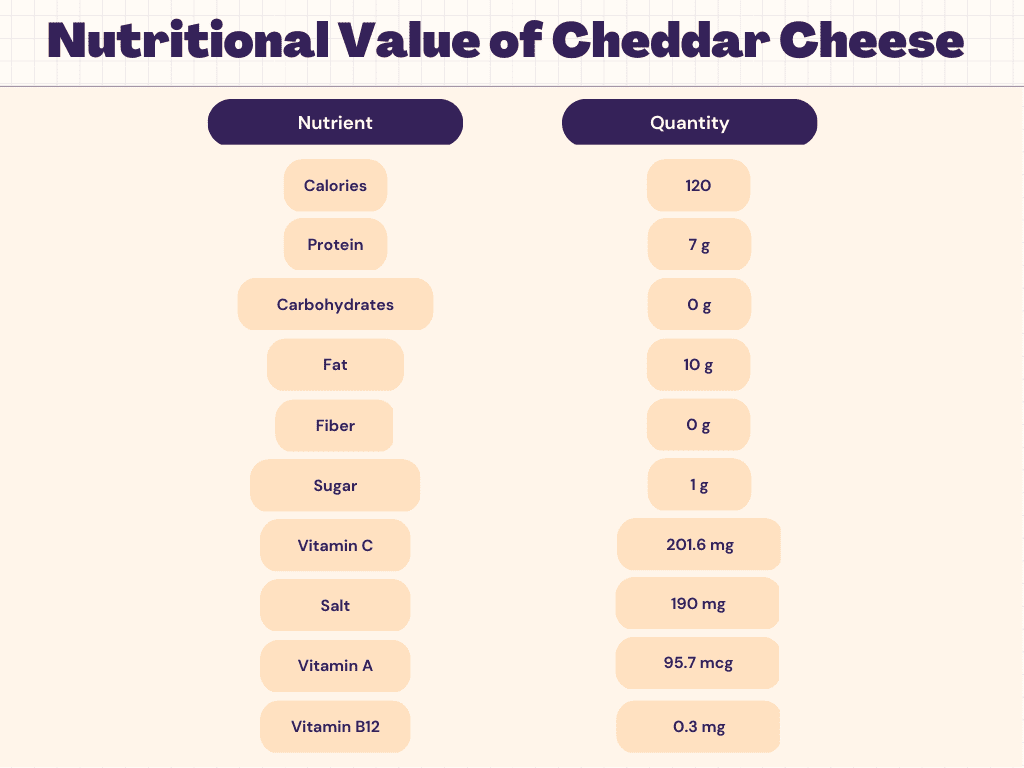Although cheddar is a tasty complement to many comfort dishes, it doesn’t always have a reputation for being healthy. The high-calorie count and a saturated fat level of cheddar cause many people to express worry. Even though it has some nutritional downsides, a small amount of cheddar can be a tasty addition to a balanced diet.
Nutritional Value of Cheese
Nutritional Facts of Cheese
Carbs
Cheddar cheese, like many other varieties, has no carbs. This implies that it contains neither fiber nor much sugar.
Fats
The majority of cheddar health worries are related to its fat level, notably the amount of saturated fat it contains.
2 It is true that whole milk cheddar has a lot of fat, particularly saturated fat (10 grams per ounce) (6 grams per ounce). A diet low in saturated fat has traditionally been recommended by nutritionists as a way to lower the risk of cardiovascular disease.
Protein
Over 30% of cheddar’s calories come from protein, which amounts to 7g per 1-ounce serving. Your daily consumption could be greatly increased by this.
Health Benefits Of Cheese
- Develops Strong Bones – The damaging loss of bone density caused by osteoporosis must be avoided by getting enough calcium.
- Increases Muscle – Protein is important for several processes, including the creation of enzymes, cell structure, fluid balance, and muscle growth.
- Energy Dense – Nobody could claim that cheddar is a calorie-empty food. This cheese has a high-calorie content, which raises its feeling of fullness.
- Might Facilitate Weight Loss – Full-fat dairy products are preferable for weight management because removing the fat from them may increase their likelihood of causing weight gain. Check out our Weight Loss Plans.
- Compatible with Low-Carb and Keto Diets – Cheddar is appropriate for this high-fat diet because of its high fat content. Cheddar is a great addition to any low-carb diet because it contains no carbs.
Vitamins & Minerals in Cheese
Cheddar contains a variety of vitamins and minerals in addition to calcium. One ounce contains 14% of the recommended daily amount of phosphorus, 10% of the recommended daily amount of vitamin A, and trace levels of zinc, selenium, and riboflavin.
The Bottom Line
Cheese is a dairy product that is rich in minerals, protein, and lipids. Parmigiano-Reggiano and aged cheddar are two examples of hard-block cheeses with low moisture content that can be stored and transported without refrigeration. Due to its reduced lactose content—a form of sugar that is difficult to digest if a person lacks the enzyme to break it down—cheese may be more tolerable than milk for certain people.
FAQs
How much Cheese can I eat in a day?
The American Heart Association advises consuming no more than three servings (each containing a maximum of 42 grams of cheese) of cheese per day.
Should I eat Cheese before or after exercise?
After a workout, milk, cheese, and yogurt should always be ingested. This is because their high fat content can make you feel tired and will increase the amount of acid in your stomach as you exercise. You can have more gas if you consume dairy products before working out.
What are the benefits of Cheese?
- Increases bone strength
- Increases muscle
- Helps in weight management
- Compatible with low-carb and the keto diet
What is the best time to eat Cheese?
Eating cheesy dishes first thing in the morning is healthful. However, eating it late at night may cause indigestion and weight gain. Bloating may result from eating cheese later in the day or in large quantities.










